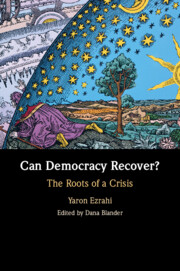Book contents
- Can Democracy Recover?
- Can Democracy Recover?
- Copyright page
- Dedication
- Contents
- Preface
- Words from the Author
- Introduction
- Part I The Rise of Western Politics following the Collapse of the Monistic Medieval Cosmology
- Part II The Emergence of the Epistemological Constitution of Modern Democracy
- Part III The Dialectics of Objectification
- Part IV The Erosion of the Epistemological Constitution of Modern Democracy
- 12 The Political Disempowerment of the Modern Democratic Citizen
- 13 The Elusiveness of Political Causality
- 14 The Loss of Self-Evident Public Facts and the Crisis of the Commonsense Conceptions of Reality
- 15 The Decay of the Epistemological Norm of Political Visibility
- 16 The Fall of Objectivity and Objectification
- Part V Democracy beyond Modernity
- Can Democracy Recover? Concluding Reflections
- Epilogue
- Index
14 - The Loss of Self-Evident Public Facts and the Crisis of the Commonsense Conceptions of Reality
from Part IV - The Erosion of the Epistemological Constitution of Modern Democracy
Published online by Cambridge University Press: 02 January 2025
- Can Democracy Recover?
- Can Democracy Recover?
- Copyright page
- Dedication
- Contents
- Preface
- Words from the Author
- Introduction
- Part I The Rise of Western Politics following the Collapse of the Monistic Medieval Cosmology
- Part II The Emergence of the Epistemological Constitution of Modern Democracy
- Part III The Dialectics of Objectification
- Part IV The Erosion of the Epistemological Constitution of Modern Democracy
- 12 The Political Disempowerment of the Modern Democratic Citizen
- 13 The Elusiveness of Political Causality
- 14 The Loss of Self-Evident Public Facts and the Crisis of the Commonsense Conceptions of Reality
- 15 The Decay of the Epistemological Norm of Political Visibility
- 16 The Fall of Objectivity and Objectification
- Part V Democracy beyond Modernity
- Can Democracy Recover? Concluding Reflections
- Epilogue
- Index
Summary
This chapter explores the erosion of trust in public facts and the crisis within commonsense conceptions of reality. It traces the evolution of scientific practices, emphasizing the role of early experimental scientists like Robert Boyle in grounding them. Ezrahi argues that the contemporary breakdown of epistemological norms, which previously upheld facts as sociopolitical currency, inevitably undermines the foundations of contemporary democracy. The citizens' diminished confidence in understanding why political actors behave in specific ways, coupled with the disparities between motives and visible effects, fosters the proliferation of conspiracy theories. The current breakdown of epistemological norms manifests itself in the “post truth” era and the ascent of “alternative facts.” Ezrahi scrutinizes the challenges of discerning facts from opinions in journalism and underscores the perils of exposure to fake news. The chapter investigates the erosion of a shared commonsense perception of reality through the lens of the Brexit campaign and the Trump presidency. Ezrahi highlights that the blurring of the cosmological dichotomy between Nature and humans has made it increasingly challenging for the public to differentiate between facts and fiction. Finally, he advocates for an awareness of the public’s role in defining political causes and facts.
Keywords
- Type
- Chapter
- Information
- Can Democracy Recover?The Roots of a Crisis, pp. 139 - 149Publisher: Cambridge University PressPrint publication year: 2025

